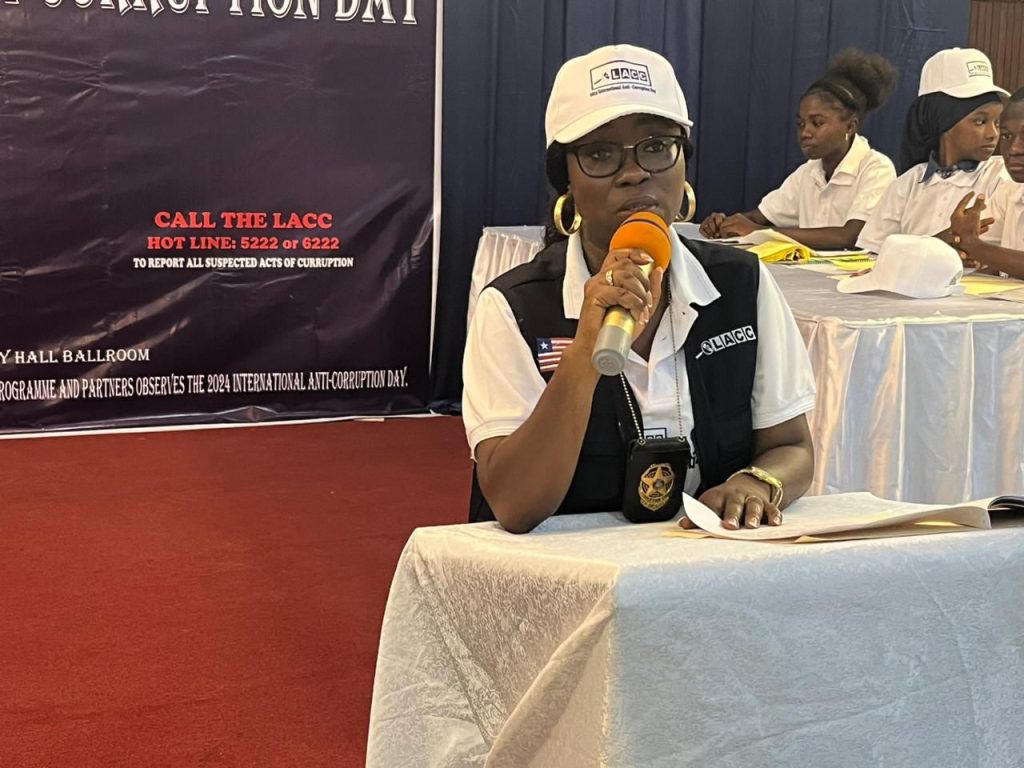Cllr. Alexandra K. Zoe, Executive Chairperson of the Liberia Anti-Corruption Commission (LACC), delivered a potent message on International Anti-Corruption Day, December 6, 2024, calling for collective action and tangible results in the fight against corruption. Speaking at Monrovia City Hall, Cllr. Zoe urged Liberia’s international partners to link program funding with demonstrable outcomes, emphasizing the need for rigorous monitoring and evaluation (M&E) of development interventions. This call for accountability aims to ensure that projects deliver on their promises and contribute meaningfully to Liberia’s development. The event, held under the national theme “Promoting Integrity and Accountability for Increased Citizens’ Participation in the Fight Against Corruption,” and the international theme “Uniting with Youth Against Corruption: Shaping Tomorrow’s Integrity,” brought together government officials, students, international partners, and civil society actors. Cllr. Zoe stressed the importance of assessing projects based on the tangible changes they bring about, advocating for the integration of M&E frameworks into all development initiatives. This, she believes, will provide valuable insights into project strengths, weaknesses, and lessons learned, ultimately improving the planning and effectiveness of future endeavors.
Cllr. Zoe’s message extended beyond international cooperation, focusing on the responsibility of Liberia’s political leaders. She condemned empty rhetoric and urged them to embody integrity and accountability in their actions. She emphasized the role model status of leaders, particularly for the youth who look up to them for guidance and inspiration. Highlighting Liberia’s upcoming “Arrest Agenda for Inclusive Development,” Cllr. Zoe expressed optimism about its potential to fulfill the aspirations of the Liberian people from 2025 to 2029. She also commended President Joseph Nyuma Boakai’s technology project for youth, anticipating that it will create employment opportunities and enhance their capacity. A central theme of her address was the vital role of youth in combating corruption.
Cllr. Zoe passionately called on young Liberians to actively participate in decision-making processes, resist the allure of corruption, and demand a seat at the table where national policies and development plans are formulated. She characterized corruption as a common enemy hindering Liberia’s progress and prosperity, urging all citizens, regardless of their background or status, to unite against this pervasive challenge. Her message resonated with a sense of collective responsibility, highlighting the shared burden of corruption and the need for a united front to overcome it.
In a poignant critique of Liberia’s development trajectory, Cllr. Zoe expressed deep dissatisfaction with the country’s inability to meet the basic needs of its citizens despite 177 years of independence. She lamented the lack of access to essential services such as pipe-borne water and stable electricity, even in the capital city of Monrovia. She also pointed to the persistent poverty, with a vast majority of the population living on less than a dollar a day, and the ongoing struggle to construct basic infrastructure like primary roads connecting county capitals. The inability to achieve food security despite abundant natural resources further underscored her disappointment in the nation’s progress.
Cllr. Zoe identified education as a crucial starting point in the fight against corruption, emphasizing its power to shape young people’s values and perspectives. She advocated for an educational approach that goes beyond academic achievements, focusing on fostering essential life skills such as honesty, accountability, and fairness. She stressed the importance of critical thinking and problem-solving skills, enabling young people to understand the significance of integrity in decision-making. This, she argued, would empower them to become agents of change and contribute to building a more ethical and prosperous society.
Cllr. Zoe’s message encompassed a comprehensive approach to tackling corruption, emphasizing international collaboration, political accountability, youth engagement, and educational reform. Her sharp critique of Liberia’s current state served as a wake-up call, urging collective action and a commitment to building a better future for all Liberians. The emphasis on tangible outcomes, rather than mere rhetoric, underscored the need for genuine progress and a departure from business as usual. Her call to action resonated with a sense of urgency and a clear vision for a Liberia free from the shackles of corruption.














